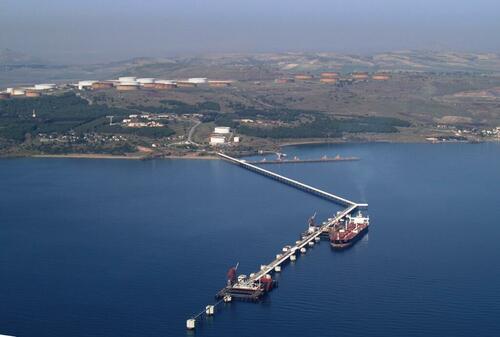Turkey Halts Operations At Ceyhan Oil Terminal After Huge Earthquake
By Tsvetana Paraskova of OilPrice,
The Ceyhan oil terminal in southern Turkey has halted operations after the devastating earthquake in Turkey and Syria early on Monday, Tribeca Shipping Agency said, as carried by Reuters.
A powerful earthquake of 7.8 magnitude on the Richter scale hit Turkey and Syria in the early hours of Monday local time, killing hundreds of people and injuring thousands more. Early estimates point to at least 600 people killed in the quake, whose epicenter was in the Pazarcik district of Kahramanmaras province in Turkey.
The Ceyhan oil terminal is around 155 kilometers, or 96 miles, from the epicenter of the earthquake.
As a whole, the ports in southern Turkey are affected by the earthquake, and there are delays to operations, according to a notice by Tribeca Shipping Agency carried by Reuters.
Natural gas supply to the Turkish provinces of Gaziantep, Hatay, and Kahramanmaras was halted after a gas transmission line was damaged as a result of the earthquake, Turkish state pipeline operator BOTAS said today.
But the key oil pipelines in Turkey have not been damaged as a result of the quake, an energy official in the country told Reuters.
Those pipelines are the Kirkuk-Ceyhan pipeline and the Baku-Tbilisi-Ceyhan pipeline. Despite the fact that the oil pipelines are intact, there could be delays to operations at the Ceyhan oil terminal, the endpoint of the Kirkuk-Ceyhan pipeline, a major export line from Kirkuk in Iraq.
The Baku–Tbilisi–Ceyhan (BTC) pipeline, for its part, is a 1,768 kilometers (1,100 miles) long crude oil pipeline from the Azeri-Chirag-Deepwater Gunashli (ACG) oil field in the Caspian Sea in Azerbaijan to the Mediterranean Sea.
Kazakhstan, which looks to diversify its oil export routes to reduce dependence on the Russian oil terminal at Novorossiysk, on the Russian Black Sea coast, plans to move more crude to the Baku–Tbilisi–Ceyhan pipeline this year.
In 2023, Kazakhstan hopes to deliver up to 1.5 million tons of oil through the Baku-Tbilisi-Ceyhan pipeline, as part of growing efforts to find export routes bypassing Russia.
Tyler Durden
Mon, 02/06/2023 – 09:15
Zero Hedge’s mission is to widen the scope of financial, economic and political information available to the professional investing public, to skeptically examine and, where necessary, attack the flaccid institution that financial journalism has become, to liberate oppressed knowledge, to provide analysis uninhibited by political constraint and to facilitate information’s unending quest for freedom. Visit https://www.zerohedge.com

